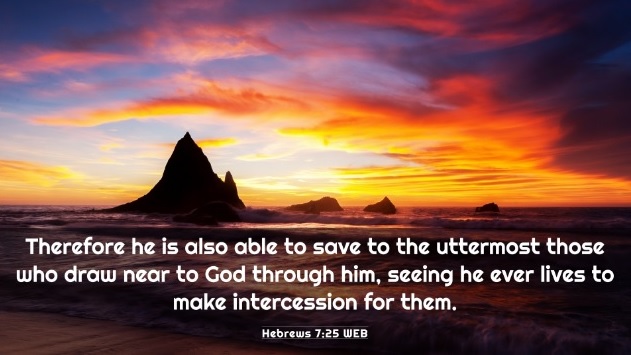“Go therefore and make disciples of all the nations…teaching them to observe all that I commanded you; and lo, I am with you always, even to the end of the age” (Matthew 28:19-20, NASB).
——————–
Contents
1) Jesus, Alive Forevermore (Doy Moyer)
2) John the Baptist: A Blend of Humility and Boldness (Bryan Gibson)
3) Sword Tips #16 (Joe R. Price)
——————–

-1-
Jesus, Alive Forevermore
Doy Moyer
“Do not be afraid; I am the first and the last, and the living One; and I was dead, and behold, I am alive forevermore, and I have the keys of death and of Hades.” (Revelation 1:17-18)
This is how Jesus described Himself after John saw the great vision of “one like a son of man, clothed in a robe reaching to the feet, and girded across His chest with a golden sash. His head and His hair were white like white wool, like snow; and His eyes were like a flame of fire. His feet were like burnished bronze, when it has been made to glow in a furnace, and His voice was like the sound of many waters. In His right hand He held seven stars, and out of His mouth came a sharp two-edged sword; and His face was like the sun shining in its strength” (Revelation 1:14-16, NASB). The power of this description speaks volumes, and it is this One who is “alive forevermore.”
Elsewhere in the book of Revelation, the Lord is said to be “The first and the last, who was dead, and has come to life” (Revelation 2:8). He is the One “who lives forever and ever” (Revelation 10:6; 15:7). Revelation shows that the power of the King of kings and Lord of lords is grounded in the fact that He is alive forevermore. Death and the powers that oppose God cannot defeat Him. His sovereignty extends over death and Hades, which will ultimately be thrown into the lake of fire (Revelation 20:14).
The resurrection of Jesus Christ is the hinge on which our faith turns. Paul clarifies that the historical reality of the resurrection is the basis for our own resurrection; without it, our faith would be in vain (I Corinthians 15:12-19). Yet because Jesus was raised from the dead, we can have confidence that what we do for Him is not in vain (I Corinthians 15:58). We cannot overstate the importance of teaching and living by the resurrection of Jesus: “and He died for all, so that they who live might no longer live for themselves, but for Him who died and rose again on their behalf” (II Corinthians 5:15).
Because He is alive forevermore, we have a living hope. The Lord “according to His great mercy has caused us to be born again to a living hope through the resurrection of Jesus Christ from the dead” (I Peter 1:3). A living hope is not grounded in a dead martyr, but a living Savior who has defeated death and through whose name alone is salvation (Acts 4:12). Hope is alive because He is alive! This is hope based on Jesus, who is our “high priest forever according to the order of Melchizedek” (Hebrews 6:20). Our hope is truly an anchor of the soul.
Further, because Jesus is alive forevermore, we have a continual Intercessor who goes to the Father on our behalf. The writer of Hebrews shows the difference between the temporary Levitical priesthood under the Law and the eternal priesthood of Jesus: “The former priests, on the one hand, existed in greater numbers because they were prevented by death from continuing, but Jesus, on the other hand, because He continues forever, holds His priesthood permanently. Therefore He is able also to save forever those who draw near to God through Him, since He always lives to make intercession for them” (Hebrews 7:23-25). Notice that Jesus “continues forever” and “always lives.” Because of this, He can “save forever” those who draw near to God through Him. This should give us confidence, knowing that our Savior lives, intercedes, and comes to our aid in time of need (cf. Hebrews 2:18; 4:15-16).
After shedding His blood, the resurrection made it possible for Jesus to enter into “the holy place once for all.” The result for us is “eternal redemption” (Hebrews 9:12). This coincides with Peter’s point about the living hope concerning the “inheritance which is imperishable and undefiled and will not fade away, reserved in heaven for you” (I Peter 1:4). We need to see that eternal redemption is grounded in an eternal Savior who defeated death.
John wrote, “And the testimony is this, that God has given us eternal life, and this life is in His Son. He who has the Son has the life; he who does not have the Son of God does not have the life” (I John 5:11-12). We can have life because Jesus is the resurrection and the life, and “He who believes in the Son has eternal life” (John 3:36). The promises of God can only make sense within a framework of life and eternity. Jesus died, but death does not have the final word. Because Jesus was raised, we have confidence that we will be raised, and “thanks be to God, who gives us the victory through our Lord Jesus Christ” (I Corinthians 15:57). He is alive forevermore!
— Via Articles from the La Vista church of Christ, March 29, 2024
——————–

-2-
John the Baptist: A Blend of Humility and Boldness
Bryan Gibson
If there was ever a man “clothed with humility” (1 Peter 5:5), it was John the Baptist. It couldn’t have come easy, when you consider the attention given his birth (Luke 1:13-15, 57-66), the importance of his work (Luke 1:16-17, 76-80; 3:2-6), the popularity he gained (Matthew 3:5-6), and the high praise given to him by Jesus (Matthew 11:7-11—“among those born of women there has not risen one greater than John the Baptist”).
Yet, despite all of this, John the Baptist remained a very humble man. He very quickly put to rest any notions about himself being the Christ, saying, “One mightier than I is coming, who sandal strap I am not worthy to loose” (Luke 3:16). When Jesus came to be baptized by him, John responded with the same humility, “I need to be baptized by You, and are You coming to me?” (Matthew 3:14). He continually deflected the attention away from himself and toward Jesus (John 1:15, 29-27, 29-30). It didn’t even bother him when his disciples left him to follow Jesus (John 1:35-42). When some of his disciples became concerned about the growing popularity of Jesus (John 3:26), he said in effect, “That’s exactly the way it should be!” His very words were, “He must increase, but I must decrease” (John 3:30).
But there was another quality John seemed to possess in equal measure: boldness or courage. When many of the Pharisees and Sadducees came to him to be baptized, John boldly said, “Brood of vipers! Who warned you to flee from the wrath to come? Therefore bear fruits worthy of repentance” (Matthew 3:7-8). He did more than just make a general call for repentance; he told them specifically what they needed to do (Luke 3:10-14). This same boldness was also directed toward Herod, whom he rebuked “concerning Herodias, his brother Philip’s wife, and for all the evils which Herod had done” (Luke 3:19). On this matter of Herod’s wife, John didn’t beat around the bush. He told Herod, “It is not lawful for you to have your brother’s wife” (Mark 6:18). That’s not easy to say to anyone, much less someone who has the power to decide your fate. If you remember, it was this rebuke that ultimately cost John his life (Mark 6:19-29). Clearly, John the Baptist was no “reed shaken by the wind” (Luke 7:24), as indicated by Jesus himself. He preached “in the spirit and power of Elijah” (Luke 1:17), who was a pretty bold prophet in his own right.
Think these two qualities—humility and boldness—don’t go together? Think again. True boldness results from humility, from a desire to magnify the Lord, and not oneself. John was not afraid to speak up, because he wanted people to know the Lord and His will for them. He was not afraid to say what needed to be said, because unlike some (John 5:44; 9:22; 12:42-43), he was not after the favor and honor of men. Men like John the Baptist seem to be in short supply today. It’s time we did something about that.
— Via Plain Words from God’s Word, March 20, 2024
——————–

-3-
“And take…the sword of the Spirit, which is the word of God.” (Eph. 6:17)
Sword Tips #16
Joe R. Price
“You have heard that it was said, ‘AN EYE FOR AN EYE AND A TOOTH FOR A TOOTH.’ But I tell you not to resist an evil person. But whoever slaps you on your right cheek, turn the other to him also. If anyone wants to sue you and take away your tunic, let him have your cloak also. And whoever compels you to go one mile, go with him two. Give to him who asks you, and from him who wants to borrow from you do not turn away” (Matthew 5:38-42).
Revenge takes matters into its own hands. Instead of justice, revenge looks for personal satisfaction at the expense of the one who has wronged us.
Jesus set the example for us of giving place to God’s justice by refusing to retaliate against those who had grievously wronged him.
If you are wronged today, let God correct the wrong that is done; He will do so in his time. Overcome evil by doing good toward those who wrong you. They won’t be expecting it!
——————–
The Steps That Lead to Eternal Salvation
1) Hear the gospel — for that is how faith comes (Rom. 10:17; John 20:30-31).
2) Believe in the deity of Jesus Christ, the Son of God (John 8:24; John 3:18).
3) Repent of sins. For every accountable person has sinned (Romans 3:23; Romans 3:10), which causes one to be spiritually dead (Ephesians 2:1) and separated from God (Isaiah 59:1-2; Romans 6:23). Therefore, repentance of sin is necessary (Luke 13:5; Acts 17:30). For whether the sin seems great or small, there will still be the same penalty for either (Matt. 12:36-37; 2 Cor. 5:10) — and even for a lie (Rev. 21:8).
4) Confess faith in Christ (Rom. 10:9-10; Acts 8:36-38).
5) Be baptized in water for the remission of sins (Mark 16:16; Acts 2:38; 22:16; 1 Pet. 3:21). This is the final step that puts one into Christ (Gal. 3:26-27). For from that baptism, one is then raised as a new creature (2 Cor. 5:17), having all sins forgiven and beginning a new life as a Christian (Rom. 6:3-4). For the one being baptized does so “through faith in the working of God” (Col. 2:12). In other words, believing that God will keep His word and forgive after one submits to these necessary steps. And now as a Christian, we then need to…
6) Continue in the faith by living for the Lord; for, if not, salvation can be lost (Matt. 24:13; Heb. 10:36-39; Rev. 2:10; 2 Pet. 2:20-22).
——————–
Tebeau Street
CHURCH OF CHRIST
1402 Tebeau Street, Waycross, GA 31501
Sunday: 9 a.m. Bible Classes and 10 a.m. Worship Service. Congregational Song Service: 5 p.m. for every first Sunday of the month.
Wednesday: 7 p.m. Bible Classes
evangelist/editor: Tom Edwards (912) 281-9917
Tom@ThomasTEdwards.com
https://thomastedwards.com/go/all.htm (This is a link to the older version of the Gospel Observer website, but with bulletins going back to March 4, 1990.)